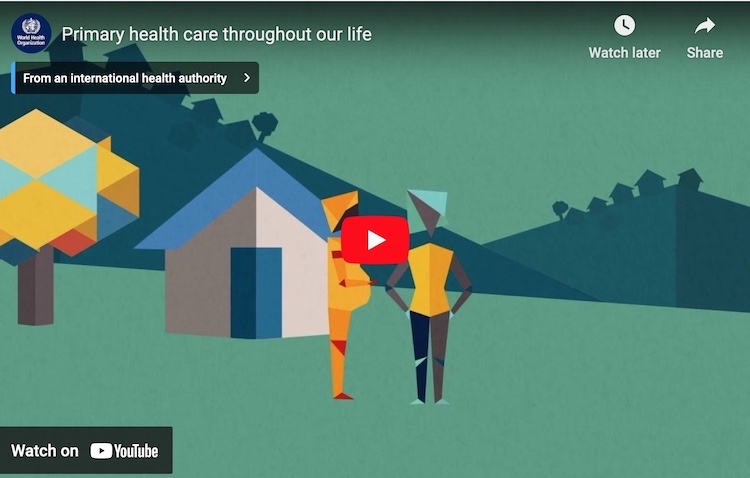By Jaya Ramachandran
PARIS (IDN) — Three multilateral development banks have joined with the World Health Organization (WHO) to launch the Health Impact Investment Platform. This is a landmark development aimed at investing in and strengthening essential, climate-resilient primary health care (PHC) services in low- and low-and-middle-income countries (LICs and LMICs).
The Platform, launched during the Summit for a New Global Financing Pact from 22-23 June in Paris, will provide an initial €1.5 billion to LICs and LMICs in the form of concessional loans and grants to expand the reach and scope of their PHC services, particularly for the most vulnerable and underserved populations and communities.
In addition to the African Development Bank (AfDB), the European Investment Bank (EIB), the Islamic Development Bank (IsDB) and WHO, the Platform has four founding members. As this is a global challenge, the Inter-American Development Bank (IDB) is also considering joining this partnership in order to extend this initiative to Latin America and the Caribbean.
It is WHO’s responsibility to ensure that financing decisions are aligned with national health priorities and strategies as the Platform’s policy coordinator, says the World Health Organization. In addition to supporting governments in developing national health plans and prioritizing PHC investments, the Platform will also aim to catalyze broader PHC investments to support government health initiatives.
PHC, according to WHO Director-General Tedros Adhanom Ghebreyesus, offers the most effective means of improving health and well-being, including providing essential health services to everyone. One of the Sustainable Development Goals (SDGs) is universal health coverage, and it is a driver of it. In 2015, world leaders pledged to provide all people with access to essential health care services as well as affordable essential medicines and vaccines.
Dr Tedros highlighted the significant role played by Primary Health Care (PHC) in delivering essential health services. Up to 90% of the required interventions can be managed through PHC, which offer a range of preventive measures including screening and vaccinations administered by doctors, nurses and other healthcare professionals at local clinics.
The introduction of the Health Impact Investment Platform will bolster these programs, safeguarding population health both now and in years to come. Furthermore, PHC is a critical mechanism for monitoring public health matters since it reaches right into communities.
In a statement, EIB President Werner Hoyer said the development banks were committed to supporting countries to strengthen their primary health care services, as well as protect against the impacts of future health emergencies.
Dr Hoyer noted that the COVID-19 pandemic highlighted the extensive human and economic losses that ensue when investments in essential health care are not prioritized. He added that through their new Health Impact Investment Platform, multilateral development banks can facilitate countries’ ability to establish enduring primary health care systems capable of dealing with future public health emergencies and protect people and economies in the long term.
Dr Hoyer also drew attention to previous collaborations between the multilateral development banks and WHO, as well as President Macron’s call for greater international financial support for any countries in need. The platform will provide access to vital overseas financing for those most in need.
Prior to the outbreak of the COVID-19 pandemic, WHO projected that Less Developed Countries (LDCs) and Lower-middle Income Countries (LMICs) should significantly expand their health spending by 2030. This would require an additional US$371 billion annually. This funding could be used to enable populations to have access to medical services, as well as construct new facilities and train and employ health personnel where they are most needed.
In addition, it is believed that in order to prepare for upcoming epidemics, an annual investment of US$31.1 billion must occur—with one third coming from external sources. The Health Impact Investment Platform’s catalytic finance strives to promote the mobilization of larger fiscal flows through national Primary Healthcare (PHC) investment plans.
The new Platform draws on the fruitful experience gained through collaboration between countries, multilateral organizations and development banks during the pandemic. WHO, EIB and the European Commission assisted Angola, Ethiopia and Rwanda in improving their health systems through stand-alone programs or as part of the countries’ response to COVID-19. These efforts facilitated technical guidance, grants and investments with favorable terms which helped to upgrade primary health care.
According to the chairman of the Islamic Development Bank, “Nations and Development Financial Institutions (DFIs) must prioritize health investments to achieve universal health coverage by 2030.” The Islamic Development Bank (IsDB) is committed to working collaboratively to generate impactful results and ensure access to quality and affordable primary healthcare for all.”
Dr. Akinwumi A. Adesina, the President of African Development Bank Group, noted that our collaboration will work towards guidance for national governments in their investments to bolster primary healthcare and the overall health structures. Through identification of any gaps in national health systems, implementation of interventions and investment strategies, securing of funding and monitoring the outcomes – universal health coverage will be increased, allowing nations to become better prepared for potential emergencies.
Ilan Goldfajn, President of the Inter-American Development Bank, has spoken about how good health and well-being are shared ambitions which bring the world closer together. To achieve these aims, coordination between countries and institutions is essential. The importance of harmony between nations and public and private sectors is a key part of making universal health coverage a reality. With that in mind, IDB are looking to extend the scope of these initiatives throughout Latin America and the Caribbean by engaging with other parties. All partners are invited to come together on this international investment platform. [IDN-InDepthNews]
Image credit: World Health Organization
IDN is the flagship agency of the Non-profit International Press Syndicate.
Visit us on Facebook and Twitter.
We believe in the free flow of information. Republish our articles for free, online or in print, under Creative Commons Attribution 4.0 International, except for articles that are republished with permission.

